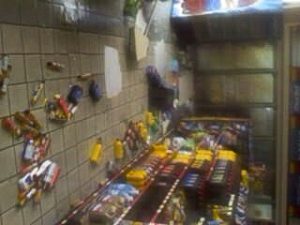Hearing the Still, Small Voice Amidst the Screaming Storm
Michael Fleischmann, member of the Collegedale Seventh-day Adventist Church in Collegedale, Tennessee, was headed toward his second customer on April 27, 2011, traveling his food-service distributor route in Trenton, Georgia, when debris traveling in the same direction as his vehicle, started passing him on the road. Turning his head to look behind him, he discovered a tornado barreling down the road, riding on his heels.
“I put my foot on the gas pedal and really took off,” Fleischmann said.
Just ahead was a convenience store, where he whipped his car in, jumped out, and headed for the doors.
“It was only about 20 feet away,” he said. “But, I felt like I was running in a dream, like you’re never going to get there. Debris was blowing by me; I was getting hit on the back by debris…Things were flying through the air, things [were] skittering across the ground past [my] feet. [The tornado was] picking up things like empty boxes and odd things like road signs and slinging them, and it’s like ‘Oh man! I gotta get out of here because those things are missiles.’ I really thought that this could be the end for me here on this Earth.”
But he made it to the door, and inside Fleishmann found a small handful of people frozen in place and not sure exactly what to do under the circumstances. He, on the other hand, knew exactly where he was going: the walk-in cooler. He told them that’s where they needed to be, too, and the group followed as windows exploded, merchandise started flying, and ceiling tiles popped out of place and fell to the floor. Fleischmann said he was certain the roof was going to come off next.
The small group waited while screaming winds and torrential rain passed over—it all happened in a mere 15-20 seconds. Once a relative calm returned, they emerged to find the store in a state of disarray, with groceries and glass scattered everywhere, and ceiling tiles decorating the floor instead. Amazingly, the roof had remained intact, and Fleischmann returned to his vehicle to find it as he’d left it, though the bank next door was roof-bare, large trees lay uprooted, and live electric wires sprawled across the landscape.
“It was just a surreal scene,” he said.
He and another member of the group lent their cell phones to others so family members could be called and comforted.
“I thanked God for protecting me,” he said. Fleischmann then called his son, whose birthday was the same day, to assure him he was alright.
Only in the hours since, has he really had time to take in everything that happened.
“It all happened so fast. There was no time to think. When everything settled, I realized how close I’d come to death.”
The brush with death has been particularly somber and reflexive for Fleischmann, who lost a son nearly seven years ago.
“It’s a very interesting feeling for me,” he said. “I don’t question that [his son’s death], but God in His wisdom, for some reason, He allowed my son to die. When we prayed over him with the pastor, we prayed for God’s will. We knew what we wanted, but we prayed God’s will. One day God is going to put that little boy back in my arms.”
Fleischmann reflected on the comparison of him being a father and knowing what’s best for his own children, and God being our Heavenly Father.
“I have to trust that God makes the decisions.”
And Fleischmann knows from experience that trusting God is the best way. He’s been through two other tornadoes, though he said he always witnessed the storms from a distance; they were never the experience he went through on April 27. But the most recent one, about 15 years ago, set the precedent for what saved his life and the lives of the other convenience store group. He was living in Indiana at the time, and a tornado ripped through town not far from where he lived, demolishing a local Domino’s Pizza franchise.
“The Domino’s Pizza was right in the path of the tornado, and it was on a cement slab. [It] was gone, but right in the middle was the walk-in cooler—it was still there. As soon as I saw that tornado—and I give the Lord credit for this—that’s the first thing that came to my mind: Where’s a restaurant or a store where there will be a walk-in refrigerator? That’s what I focused on immediately as I stepped on the gas. And there it was. I was about 100 yards from the store when I saw the tornado. The timing was all perfect.”
That’s what influenced him to think of a cooler instead of the typical basement, bathtub, or hallway. Despite his out-of-the-box thinking, he’s humble about his heroism.
“It was a reflex. I just saw them standing there, and I knew where I was going. And I wanted them to know here’s where you need to go because here is where you’re going to be safe. To me, it just feels like something anybody would do,” he said. “I’m just glad they’re OK; I’m just grateful that I could do it. That’s all that matters to me.”


